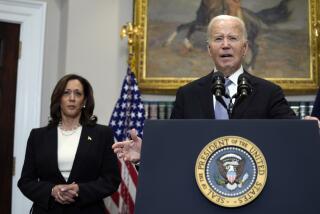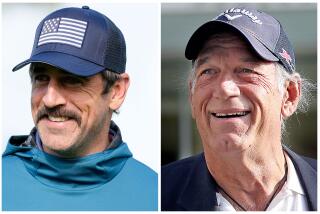Edwards May Be Keeping No. 2 Card Up His Sleeve
- Share via
JACKSON, Tenn. — Sen. John Edwards, who had insisted that he would not accept an invitation to run as the Democratic vice presidential candidate in the fall, appeared to crack that door open a bit Sunday -- one day after rival John F. Kerry cemented his status as front-runner with victories in Michigan and Washington state.
Appearing on ABC’s “This Week With George Stephanopoulos,” Edwards repeated his statement that there were no circumstances under which he would campaign as vice president. But then he hedged.
“Here’s the problem with the question,” the North Carolina senator said. “You don’t know what’s going to happen a month, three months, six months from now. As I sit here today, I intend to fight with everything I’ve got to be the nominee.”
His spokeswoman, Jennifer Palmieri, said later that the remark did not signal a change, and that Edwards continued to believe he would face off against President Bush in November -- even as many of Edwards’ supporters said they expected Kerry, a Massachusetts senator, would be the Democratic nominee.
“If anything, the situation is more clear to him that this is narrowing down to a two-person race,” Palmieri said after Edwards spoke to more than 100 people here at a community center. She described the race as still in its early stages.
Edwards’ comments came just two days before crucial showdowns in Virginia and Tennessee. He hopes to secure a position as the top challenger to Kerry by sending retired Gen. Wesley K. Clark of Arkansas home.
In some ways, the Oklahoma primary last week was the one that got away.
An additional 1,200 votes, maybe one more election-eve Edwards swing through Tulsa, which may have gotten his “Two Americas” speech on the evening news, and Clark would be gone. But Clark, a fellow Southerner, eked out a win there last week and is still alive.
Now, instead of going head-to-head against Kerry, Edwards is dodging fire from Clark over his Senate voting record and an income tax proposal, and competing with the former general for second-place finishes.
Although some Edwards staffers had lobbied for one more pre-primary swing through Oklahoma, the campaign wasn’t doing much second-guessing internally about what might have been.
Some analysts, however, said Edwards’ decision not to do more last-minute work in Oklahoma could prove to be a major headache.
“If you let your opponent live another week, the problem is you have to live with him for another week,” said Susan McManus, a political analyst at the University of South Florida, adding that the longer the fight lasts to see who will be Kerry’s challenger, the more voters will view it as a race for the silver medal. “It’s inflating the notion that [Edwards and Clark] are both only fit to be vice president,” she said.
After Edwards’ afternoon speech here Sunday, supporter Jeremy Peppas, 33, said he would vote for Edwards now, but expected to vote for Kerry in November.
“If he can’t win in the South, where is he going to win?” asked Peppas, a local sportswriter, adding that he “wouldn’t be disappointed” if Edwards joined a Kerry ticket.
Edwards has sought to survive the political demolition derby by staying out of the way and letting his opponents do the denting until two cars remain -- his and the front-runner’s.
Under that plan, the campaign had hoped the field would have narrowed more by now.
Edwards hopes to knock Clark out of the race Tuesday by finishing second behind Kerry, and putting the final nail in former Vermont Gov. Howard Dean’s campaign with a similar finish in Wisconsin next week.
Although about 75% of the Democratic delegates are up for grabs, Kerry has won all but two of the 11 primaries and caucuses, giving him commanding momentum going into what will likely be the decisive Super Tuesday round on March 2.
Still, Edwards argues that the heart of the race has yet to begin.
“This process needs to go on,” Edwards said Sunday morning on ABC. “We have a long way to go to decide who this nominee’s going to be.”
Edwards has based much of his campaign on his contention that he is best-suited among the candidates to bring the South back to the Democratic Party, a claim that will look dubious if Kerry wins Virginia and Tennessee on Tuesday. Local polls show the Massachusetts senator with comfortable leads in both places.
While Edwards continues to jockey for position, Kerry has been building the kind of national momentum that will be difficult to overcome for the North Carolina senator, who was a political unknown to most of the country when he joined the race in January 2003.
Campaigning will be particularly challenging in delegate-rich states such as California and New York, where advertising is expensive and the geography too large for the kind of retail politics that Edwards excelled at in Iowa.
“What [Edwards] needs to do is show that he’s a national candidate, and what he’s shown is that he’s a regional candidate,” said Ron Faucheux, a political analyst in Washington, D.C.
“I think Democrats have decided that John Kerry is the best presidential material. Even if Edwards wins Virginia and Tennessee, it doesn’t mean he can crack this race open. Kerry is winning every place outside of the South, and in the South he’s holding his own.”
*
(BEGIN TEXT OF INFOBOX)
Weekend caucus results
Maine (Sunday)
John F. Kerry 45%
Howard Dean 26%
Dennis J. Kucinich 15%
John Edwards 9%
Wesley K. Clark 4%
Al Sharpton 0%
50% reporting
Michigan (Saturday)
Kerry 52%
Dean 17%
Edwards 13%
Sharpton 7%
Clark 7%
Kucinich 3%
100% reporting
Washington (Saturday)
Kerry 49%
Dean 30%
Kucinich 8%
Edwards 7%
Clark 3%
Sharpton 0%
97% reporting
Source: Associated Press
Los Angeles Times
Some figures do not total 100% because fringe candidates and those who left the race are not listed.
More to Read
Get the L.A. Times Politics newsletter
Deeply reported insights into legislation, politics and policy from Sacramento, Washington and beyond. In your inbox twice per week.
You may occasionally receive promotional content from the Los Angeles Times.











